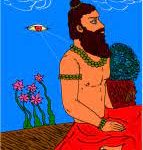The myths about Dirghatamas’s parentage varied widely; he was described as a son of Kasi-raja (according to the Mahabharata), of Uchathya (in the Rigveda), and of Utathya by Mamata (in the Puranas). But this brahmin came to be seen as having fathered a line of kings, so he inherited much more interesting parental karma in another version in the Mahabharata.
One day Brihaspati, the ancient teacher of the devas (gods), was overcome by passion for Mamata, his brother Utathya’s wife. Mamata was already pregnant with Utathya’s child and tried to dissuade Brihaspati saying that she could not hold the power of two sets of seeds at the same time. Utathya’s unborn child had already mastered the Vedas. Brihaspati forced himself upon Mamata. During intercourse, the child inside the womb told Brihaspati that what he was doing was wrong and kicked the semen out of the womb with his foot. Brihas- pati became angry and cursed the unborn child to be born blind. So Utathya’s child received the name Dirghatamas, which means “one who is in eternal darkness.”
Though blind, Dirghatamas equaled Brihaspati in brilliance. He married Pradveshi and had many children by her. Then he became so contemptible in his behavior toward his family that his wife and the members of their hermitage put him into a raft to get rid of him. King Bali rescued the blind old sage (rishi) and decided to have the sage produce brilliant children from his infertile queen. However, she substituted a maid, with whom the old brahmin produced eleven brilliant children. Then the king discovered his wife’s deception and sent her back to the old sage. The queen gave birth to five sons, who founded kingdoms with the modern names of Bhagalpura, Bengal, Andhra, Rajasahi, and Tamravika.

